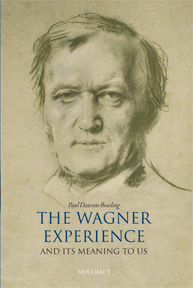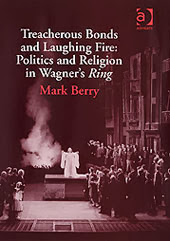Given the location, the topics and a very fine list of guest speakers, if you can be in London on July 3, its difficult to find a reason not to attend.
Wagner's Parsifal and the Challenge to Psychoanalysis
International Day Conference
Location: The Freud Museum, London
July 3, 2016
In our conference 'Wagner, Freud and the End of Myth' (2013) we argued that by taking the mythic dimension and bringing it into the human realm, Wagner anticipated Freud in his depiction of unconscious processes of the mind. It could be said that Freud and Wagner were dealing with the same stuff - the “fundamental psychosexual issues that affect us all” as Barry Millington put it, and for that reason a fruitful dialogue can exist between their two bodies of work.
The present conference is entirely devoted to Wagner’s final masterpiece, Parsifal, and explores whether this sublime, troubling and contentious work prefigures psychoanalytic insight or resists psychoanalytic interpretation. As a story of compassion and redemption, which nevertheless describes a world of perversion and mental anguish, what can Parsifal tell us about the secret springs of human desire and the conflicts of human nature? And how did Wagner manage to create it?
PROGRAMME
Tom Artin
Primal Scene/Primal Wound: The psychoanalytic arc of Parsifal
After they have witnessed the scarlet-suffused ritual revealing the Grail in Act I, Gurnemanz poses to Parsifal the primal question: Weißt du was du sahst? Do you know what you saw? This question is an enigma whose solution becomes the goal of the “pure fool’s” arduous quest. The answer, we will discover, is the primal scene, which, in Act II, is experienced by our hero not just vicariously, but in the flesh viscerally and shatteringly in Kundry’s passionate embrace. “Amfortas! The wound!” Parsifal cries out in retreat from the brink of penetration. In that sudden insight, he is overwhelmed by the reality of the castration threat lurking at the heart of every primal scene. The emotional sequelae following upon erotic enlightenment—guilt, remorse, compassion, and finally absolution—constitute the measured denouement of Parsifal, which culminates in a fantasy of redemption and the illusory resolution of primal anxiety.
Stephen Gee
Wagner’s Parsifal: A Hymn of Purity and Danger
Parsifal, the fool, is thrown out of an ailing religious community after witnessing a mysterious ritual of healing and purification, reluctantly officiated by a disgraced spiritual leader condemned to unremitting agony. In Act 11 he wanders into a magic garden, and almost gets involved in a sort of 19th century chemsex party. Alarmed by the sudden arousal of his desire and the prospect of endless enjoyment, he longs to return to the earlier scene of anguish and humiliation, which he begins to understand for the first time. A nostalgia for the sublime propels him back to the community of knights, where he is met by his penitent seductress, Kundry.
Wagner’s operas have provoked many great philosophers. Some, like Adorno, were hostile to what they saw as an ideological forerunner of 20th Century political catastrophes. Psychoanalysis raises another kind of intellectual challenge. Is Parsifal a menacing premonition of totalitarianism, or does it elaborate with unprecedented complexity the enigmatic after-effect of the trauma of human beings throughout history, who can never predict whether they will survive together in communities continually subverted by unconscious desires?
Tom DeRose
Wagner, Freud and Nietzsche in Berlin
With reference to Dmitri Tcherniakov’s recent Berlin production, this paper will consider the relationship between the character of Gurnemanz in Wagner’s Parsifal and Nietzsche’s conception of the ascetic priest in On the Genealogy of Morals. Although Gurnemanz appears as an un-biased narrator, something akin to the Evangelist in a Bach Passion, just how far removed from the action is he? I will suggest that the insights of Freud and René Girard can help us to gain a deeper understanding not only of this ‘all knowing’ story-teller, but also of the violence which lies at the heart of social systems.
Mark Berry
Interpreting Wagner’s Dreams: Staging Parsifal in the Twenty-First Century
Parsifal, like all of Wagner’s dramas, has much to tell us at the intersection of authorial intention and latent content. What is revealed and what is repressed? Dreams were certainly of great importance to Wagner, perhaps most famously in his claim that the Prelude to Das Rheingold had come to him in ‘a kind of somnambulistic state … the feeling of being immersed in rapidly flowing water,’ and indeed in the dramatic material of a number of his works. Die Meistersinger von Nürnberg is explicitly concerned with the formation of an artwork initially revealed in a dream world. That offers an interesting way to consider stagings of his works too, and their claims to fidelity or otherwise at a textual or allegedly ‘deeper’ level. I shall consider the work ‘itself’ and its adamant claim to stand apart from the operatic repertoire as a Bühnenweihfestspiel (‘stage-festival-consecration-play’) to be confined to his artistic temple at Bayreuth. I shall also consider two particular productions: Stefan Herheim (Bayreuth, 2008-12) and Dmitri Tcherniakov (Berlin, 2015-). How do directors and performers navigate the historical, social, cultural, and psychological distances and conflicts between Wagner’s intentions, his ability and inability to fulfil and perhaps even to transcend those intentions, and the needs of contemporary theatres and audiences? What is gained and what is lost? What, again, is revealed and what is repressed?
Patrick Carnegy
Syberberg's Parsifal and the soul of Germany
Hans Jürgen Syberberg's 1982 film of Parsifal is a psychological exploration of the opera, its roots in Wagner's mind, and its historical afterlife. Abstracted from Amfortas's body, his wound, carried about on a cushion by two female pages, becomes a symbol of Germany's unassuaged shame and guilt, an object of fascination and horror until it can be healed. When Kundry's kiss awakens Parsifal's sexuality, Syberberg sensationally replaces the male hero by a female Parsifal. His idea, in Jungian terms, is that the animus cannot itself complete the therapeutic journey through the psychic labyrinth, for this is given only to the anima, which here also embodies the soul of Germany. Patrick Carnegy offers some reflections on the wondrous complexity and resonance of this brilliant film.
Eva Rieger
Kundry's kiss and the fear of female desire: A gender perspective
“Wagner’s operas are largely dramas of incestuous feelings and urges” writes James M. McGlathery (in Wagner’s Operas and Desire). Lawrence Dreyfus has also made it clear that Wagner was obsessed with sexuality, and this obsession determined the composition of operas such as Tannhäuser, Walküre and Tristan and Isolde. In his opera Parsifal, Wagner creates a female character who shows active sexual desire, and then exorcises her qua Woman for precisely that reason. Whereas men can desire women, the opposite is regarded as dangerous. In previous works, Wagner gives women like Elsa, Brünnhilde, Elisabeth and Sieglinde the power to love in a “feminine” way, but unlike Kundry they do not think of sex. I will trace the role of Kundry as she was developed by Wagner from 1865 onwards, using the development of her role to deduce which characteristics of her personality were important to him. A further clue is given by the music which speaks to us and opens up psychological insights. With respect to the semi-religious content of Parsifal, I find that the idea of gender equality is jettisoned here, which means that one can debate whether Kundry’s death is the result of Wagner’s antisemitism or his antifeminism. Finally, the question arises why Wagner should condemn women’s sexuality in such a manner (and thereby condemn the women themselves), although he was dependent on the emotional and physical love of women throughout his life.
Karin Nohr and Sebastian Leikert
Dr Kundry's Failure
The first part of this lecture sets out to investigate reasons for the well-known fact that Wagner's music and in particular his opera Parsifal evokes divergent feelings and promotes polarization among the audience. After exploring the semantic system of music which Leikert calls ‘kinaesthetical’, three principles are put forth that organize it: repetition, seduction, ritualization. Whereas religious ritualization is conservative and norm-orientated, the ethical orientation of art is creative and encourages the subject to broaden in autonomy and in the recognition of their inner world including their conflicts and the tragic aspects of life. The second part of the lecture discusses the question, if and how Wagner in Parsifal contributes to this progressive aim by analyzing the composer’s concept of empathy (Mitleid) and focusing on the Parsifal-Kundry relationship.























































